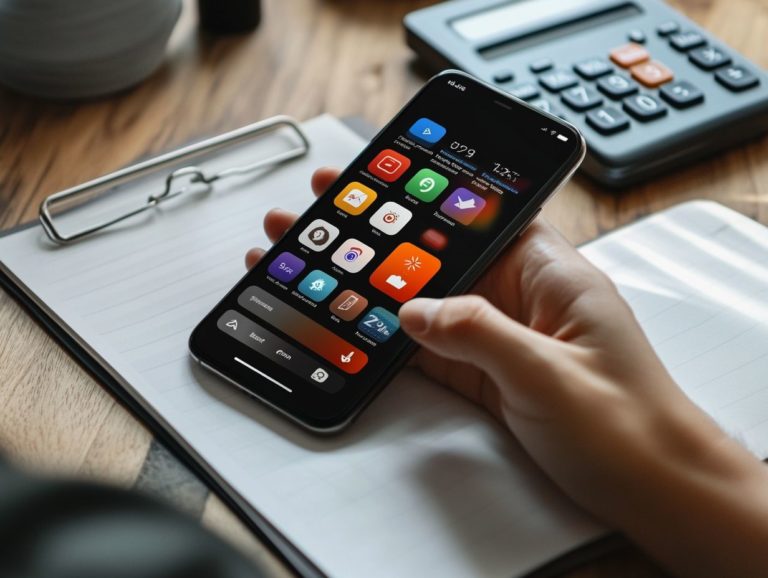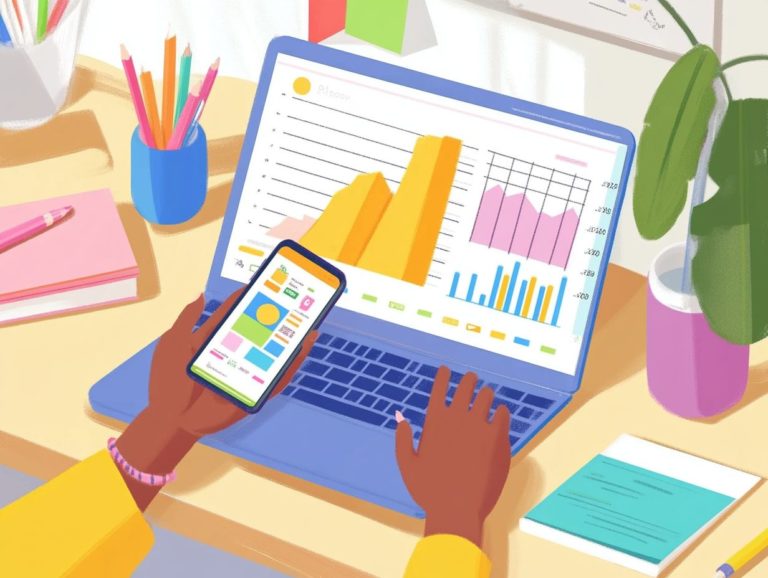5 Budgeting Tools for Effective Money Management
Navigating personal finances can seem daunting, but with the right budgeting tools, you can truly transform your financial journey.
From tracking your expenses to achieving your savings goals, these tools are crucial for managing your money effectively.
In this exploration, you’ll discover five popular budgeting tools Personal Capital, Mint, YNAB, EveryDollar, and Goodbudget.
You ll learn what features to prioritize, the common pitfalls to sidestep, and how these tools can empower you to reach your financial aspirations.
Dive in and take charge of your financial future!
Contents
- Key Takeaways:
- 1. Personal Capital
- 2. Mint
- 3. YNAB (You Need a Budget)
- 4. EveryDollar
- 5. Goodbudget
- What Are Budgeting Tools and Why Are They Important?
- Frequently Asked Questions
- What are the top 5 budgeting tools for effective money management?
- How does Mint help with budgeting?
- What makes YNAB different from other budgeting tools?
- Can Personal Capital help with long-term financial planning?
- Is EveryDollar suitable for beginners?
- How does Goodbudget differ from other budgeting apps?
Key Takeaways:
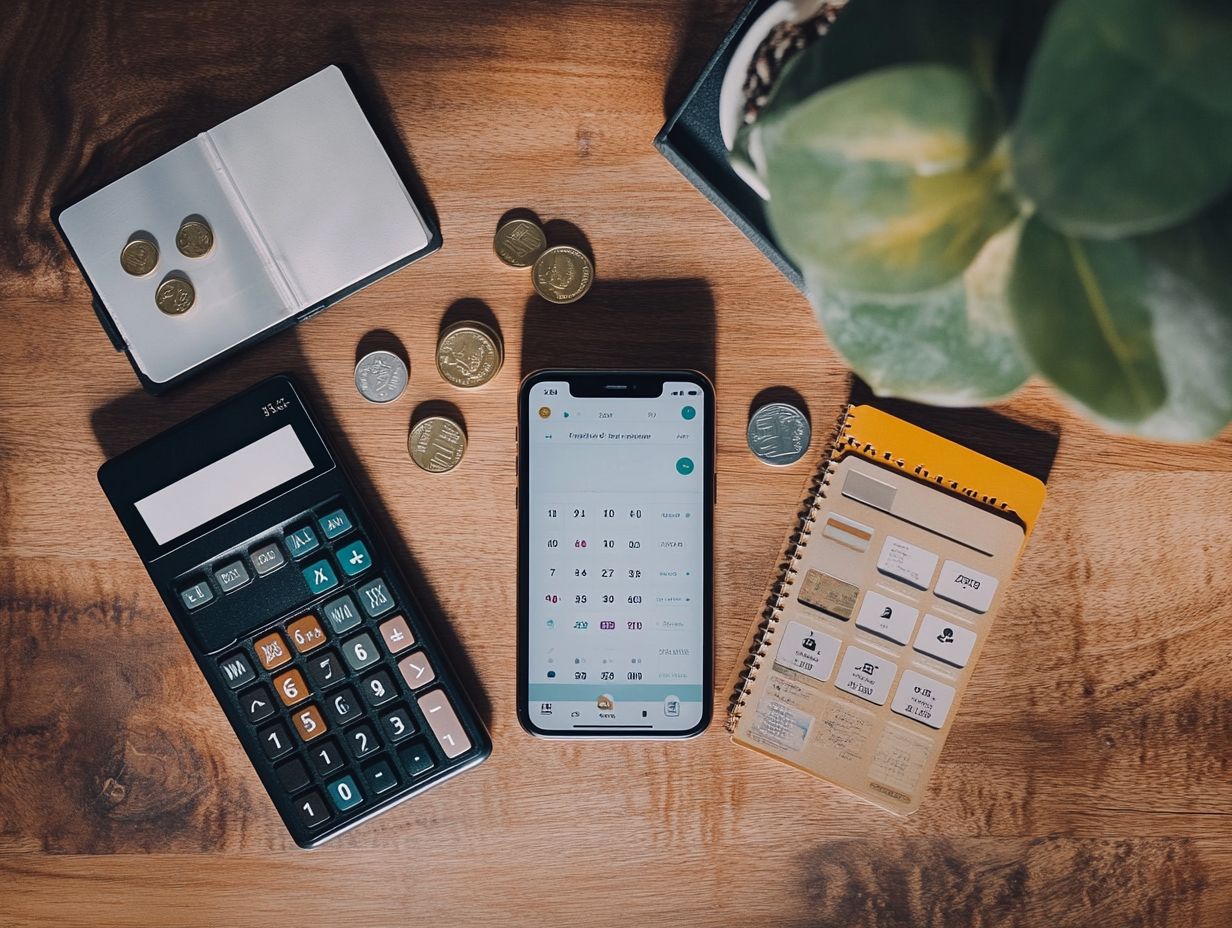
- Personal Capital, Mint, YNAB, EveryDollar, and Goodbudget are top budgeting tools for effective money management.
- Budgeting tools help track expenses, create budgets, and plan for financial goals.
- Look for budgeting tools with features like budget categories, goal tracking, and automatic expense tracking.
1. Personal Capital
Personal Capital serves as your all-in-one personal finance tool, equipped with strong features for budgeting and investment tracking.
It helps you achieve your financial aspirations, all seamlessly integrated into a single platform designed to elevate your financial management and health.
With its user-friendly dashboards, you can easily monitor your expenses, offering a clear view of where your money flows each month.
The platform s seamless integration with various bank accounts provides real-time financial reporting, allowing you to stay effortlessly on top of your finances.
Personal Capital also offers customizable tools that help you set and reach savings targets, enabling you to take control of your financial future.
Users love how data visualizations make complex financial information easy to understand! Plus, with dedicated customer support just a click away, you can navigate the platform with confidence.
2. Mint
Mint is an exceptional budgeting app designed to help you effortlessly track your spending, manage debts, and create budgets.
It gives you a clear snapshot of your financial health and enables your financial planning.
With its seamless bank integration, Mint automatically syncs your transaction data, allowing you to see where your money goes in real-time.
You ll appreciate the alerts for bills and recurring expenses that help you stay on top of your financial obligations and steer clear of late fees.
The intuitive, user-friendly interface enhances your experience, enabling you to navigate your financial landscape with ease.
While Mint stands out with its comprehensive features compared to other budgeting tools, it s worth noting some limitations.
For instance, you might find the lack of customized savings goals and investment tracking a drawback if those are essential to your financial strategy.
3. YNAB (You Need a Budget)
YNAB (You Need a Budget) is the innovative budgeting tool designed just for you, employing a budgeting method where you assign every dollar a specific purpose.
This method not only streamlines your expense management but also allows you to effectively track your spending.
By adopting this methodology, you re not just fostering better habits; you re enabling yourself to take control of your financial future through proactive planning.
The platform offers a rich array of educational resources, including workshops, podcasts, and articles that unravel budgeting concepts and provide you with practical strategies.
One of its standout features, goal tracking, enables you to visualize your progress towards specific financial objectives whether you re saving for that dream vacation or tackling debt.
With responsive customer support at your fingertips, you can seek guidance whenever you need it, enhancing your overall budgeting experience.
Countless users have shared their success stories of achieving financial freedom, showcasing how consistent engagement with YNAB transforms aspirations into reality.
4. EveryDollar
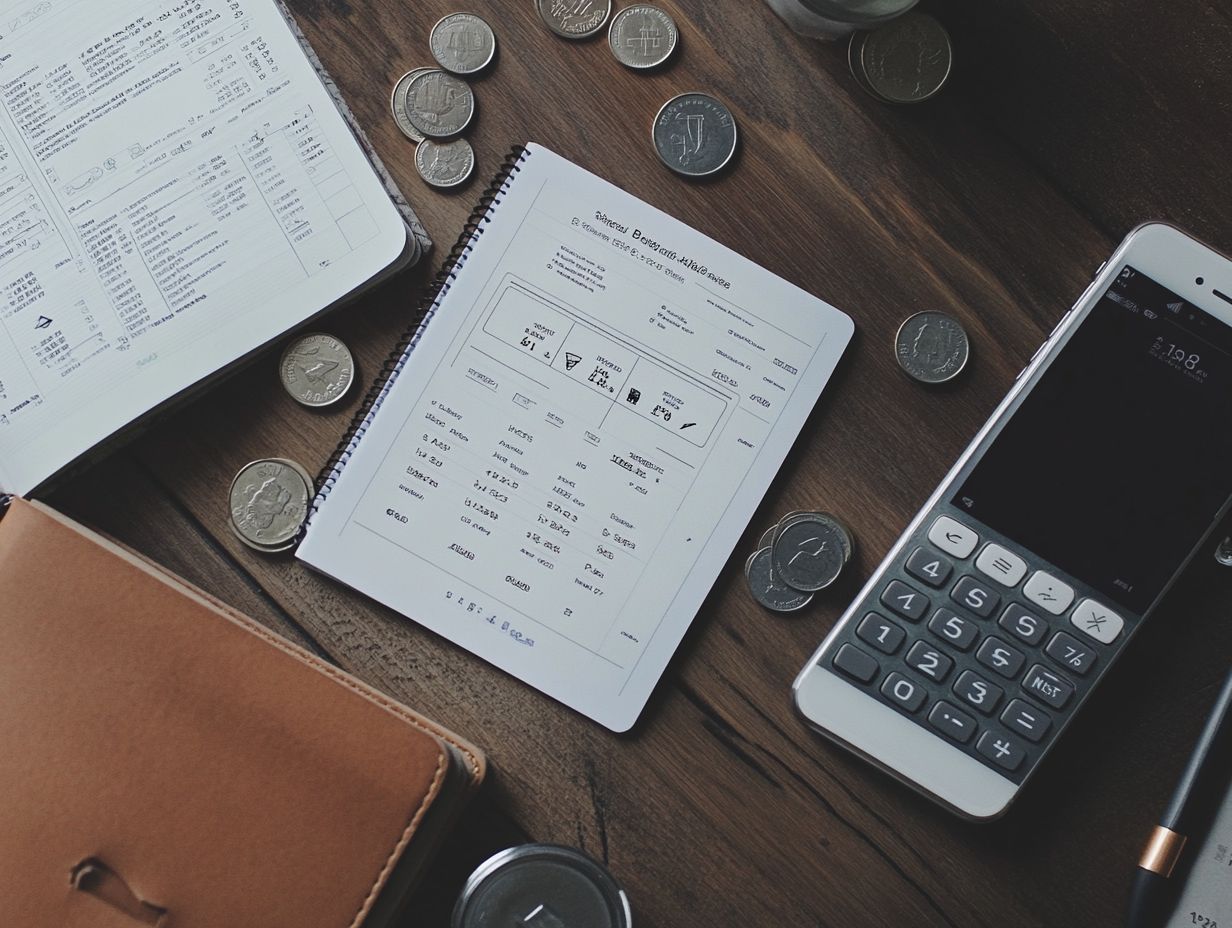
EveryDollar is your go-to budgeting app, crafted to make budgeting easy and fun. It helps you create and stick to monthly budgets, track your spending, and reach your financial goals all without unnecessary features that often complicate financial software.
Its user-friendly interface lets you effortlessly input your income and expenses. This turns financial management into a smooth experience.
With tools like expense tracking and seamless bank integration, you’ll gain real-time insight into your spending habits. Unlike other budgeting applications that can overwhelm you with many features, EveryDollar champions simplicity, breaking your finances down into manageable chunks.
User feedback consistently praises this straightforward functionality, highlighting how it streamlines the budgeting process and adheres to the core principles of financial organization. It stands out as a top choice for anyone seeking clarity on their financial journey.
5. Goodbudget
Goodbudget is your virtual envelope budgeting app, designed to help you manage your finances by carefully tracking your spending and expenses. This ultimately enhances your financial health and discipline.
It also allows you to allocate specific amounts of money to different categories, such as groceries or entertainment, encouraging mindful spending. The app s user-friendly interface makes it easy to track these envelope allocations, allowing you to visualize your financial aspirations effortlessly.
With features like debt management tools, you can prioritize your repayments. Bill payment reminders help you stay on top of crucial deadlines, minimizing the risk of late fees.
By regularly updating your envelopes, you can easily see how much you have left for the month. This enables you to make informed spending decisions and steer clear of financial pitfalls.
What Are Budgeting Tools and Why Are They Important?
Budgeting tools are essential allies in your personal finance journey. They help you plan your finances, manage expenses, track your spending, and ultimately achieve your financial health and goals. Learning how to use budgeting tools effectively is crucial for effective financial management.
They not only simplify the budgeting process but also offer valuable insights into your spending habits, enabling you to make informed decisions about your finances. By categorizing your expenses and visualizing your cash flow, you can pinpoint areas where you might cut back or save for future aspirations.
When choosing the right budgeting tools, consider factors like ease of use, compatibility with your financial institutions, and features that align with your personal preferences. Exploring the best budgeting tools for managing debt ensures that the tools cater to your unique financial situation and aspirations.
Ultimately, embracing these tools can enable you to take charge of your financial journey and instill a sense of confidence in managing your money.
How Do Budgeting Tools Work?
Budgeting tools enable you to systematically track your spending, categorize your expenses, and set financial goals. To learn more about these resources, check out what tools can help me budget effectively. They offer a structured approach to financial management that encourages accountability and awareness.
When you use these tools, you start by entering your income and expenses into the system. It then organizes each item into predefined categories like housing, groceries, and entertainment. This organization allows you to see exactly where your money is going and spot areas where you can cut back.
Many budgeting tools also offer automated reporting, which gives you insightful summaries of your spending patterns over time. With alerts for upcoming bills, they ensure you never miss a payment. By utilizing these features, you can make informed decisions, monitor your progress toward financial objectives, and cultivate healthier spending habits.
What Features Should You Look for in a Budgeting Tool?
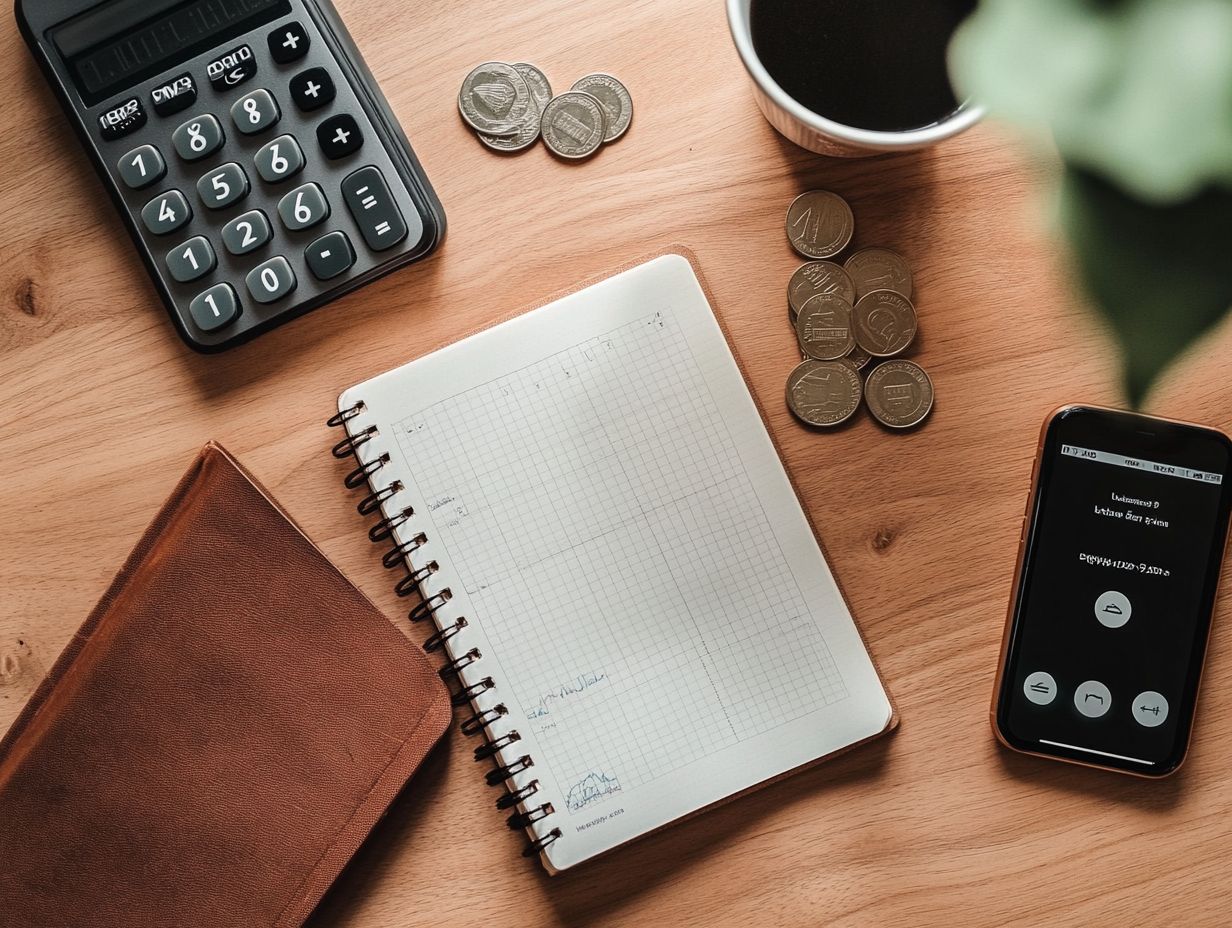
When selecting a budgeting tool, it’s essential to prioritize features like easy-to-read summaries, bank integration, expense tracking capabilities, and tools that support budgeting for setting and monitoring your financial goals.
Beyond these key attributes, a user-friendly interface can greatly enhance your overall experience. This makes it easier for you to engage with your financial data.
Compatibility is also crucial, as it allows you to gain a holistic view of your finances by interacting with various investment products. Alerts for upcoming bills or payments can help you avoid those pesky late fees.
Don t overlook customer support having reliable assistance can simplify troubleshooting and optimize your use of the tool. Popular choices like Mint and YNAB (You Need A Budget) shine in these areas, offering a seamless experience for anyone looking to take charge of their finances.
What Are the Pros and Cons of Using Budgeting Tools?
Using budgeting tools has its perks and pitfalls. While they can greatly enhance your financial management and promote better financial health, they also bring challenges such as reliance on technology and the risk of data security concerns the possibility of your financial information being stolen.
These tools enable you to easily track expenses, categorize spending habits, and set financial goals. All these contribute to a clearer understanding of your financial landscape.
With visual aids like graphs and charts, you can uncover trends over time, making it simpler to spot areas that need improvement. However, depending too much on these digital platforms might create a reliance that could hinder your ability to manage finances without them.
Technical hiccups, such as app malfunctions or data breaches, can lead to frustration and compromise your trust. You must weigh the benefits against these potential setbacks to find the right approach for your financial journey.
How Can Budgeting Tools Help with Financial Goals?
Budgeting tools are essential for helping you set and achieve your financial goals. They enable you to track spending, manage debts, and can significantly improve your approach with 5 budgeting tools to simplify your financial life, effectively allocating resources toward your savings targets.
Whether you prefer mobile apps or desktop software, these tools enable you to visualize your financial landscape. This clarity makes it easier to prioritize essential expenses while eliminating unnecessary expenditures.
For example, if you’re aiming to save for retirement, you can set specific milestones within these platforms like contributions to a retirement account or tracking the growth of your investments over time.
Similarly, if your focus is on paying off debt, you can monitor your repayment progress and set savings goals for larger payments. By offering detailed insights and reminders, budgeting tools transform daunting financial tasks into manageable steps, ultimately guiding you closer to your objectives.
What Are Some Common Mistakes to Avoid When Using Budgeting Tools?
When using budgeting tools, you’re likely to stumble upon common mistakes that can undermine your financial management efforts. These include underestimating expenses, neglecting to update your budgets regularly, and failing to set realistic financial goals.
Such missteps can easily derail your path to financial stability and may even lead to debt if left unaddressed. It’s essential to recognize that expenses can fluctuate, and unexpected costs often arise, making it imperative for you to track these changes accurately.
By regularly reviewing and adjusting your budgets, you can adapt to your evolving financial landscape. Setting achievable financial goals enhances this practice, providing you with clear milestones to measure your progress.
Engaging with budgeting tools frequently allows you to adopt a proactive approach to your finances, cultivating healthier spending habits and ultimately securing your long-term fiscal well-being.
Frequently Asked Questions
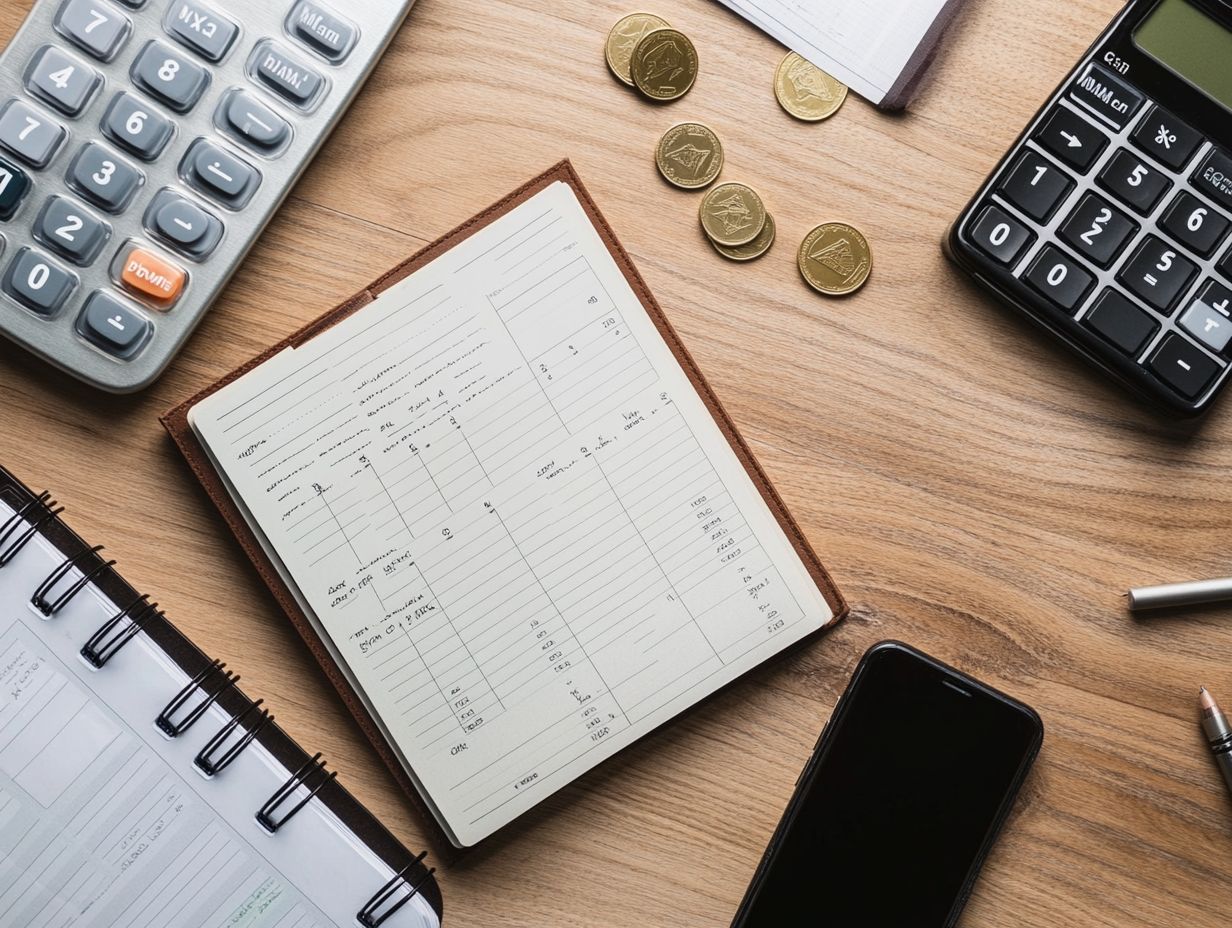
Are budgeting tools worth it?
Absolutely! They help you gain control over your finances and make informed decisions.
Can I use budgeting tools for debt management?
Yes, many budgeting tools offer features designed specifically for managing and paying off debt.
How often should I update my budget?
It’s best to update your budget regularly at least once a month to reflect any changes in your financial situation.
Start using budgeting tools today to take charge of your finances!
What are the top 5 budgeting tools for effective money management?
The top 5 budgeting tools for managing household expenses are Mint, YNAB, Personal Capital, EveryDollar, and Goodbudget.
How does Mint help with budgeting?
Mint is a free budgeting tool. It helps you track spending and create budgets. You ll receive alerts when you overspend, and it categorizes your expenses to show your financial habits visually.
What makes YNAB different from other budgeting tools?
YNAB stands for You Need A Budget. This tool focuses on giving every dollar a job and helps you plan for the future. It s perfect for breaking the cycle of living paycheck to paycheck!
Can Personal Capital help with long-term financial planning?
Yes, Personal Capital tracks spending and budgeting. It also offers valuable tools for retirement planning, investment monitoring, and tracking your net worth.
Is EveryDollar suitable for beginners?
Absolutely! EveryDollar is user-friendly and uses the zero-based budgeting method. It s designed to be simple for beginners to understand and use.
How does Goodbudget differ from other budgeting apps?
Goodbudget uses the envelope system, which mimics the traditional cash envelope method. You can allocate money to specific categories and track your expenses accordingly.

